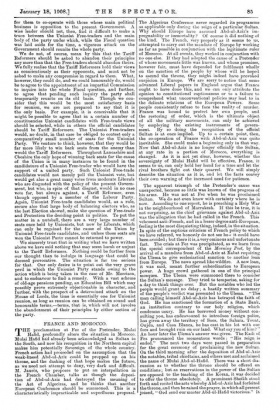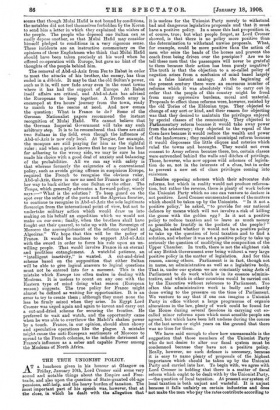FRANCE AND MOROCCO.
ri"HE proclamation at Fez of the Pretender, Mulai Hafid, profoundly alters the situation in Morocco. Mulai Hafid had already been acknowledged as Sultan in the South, and now his recognition in the Northern capital makes' him potentially Sovereign of the whole country. French action had proceeded on the assumption that the weak-kneed Abd-ul-Aziz could be propped up on his throne, and the dashing of that hope makes the future, as we need not attempt to -deny, very dark and difficult. M. Jaures, who proposes to put an interpellation in the French Chamber, talks as though the deposi- tien of Abd-ul-Aziz had destroyed the meaning of the Act of Algeciras, and. he thinks that another European Conference should be summoned. This is a characteristically impracticable and superfluous proposal. The Algeciras Conference never regarded its programme as applicable only during the reign of a particular Sultan. Why should Europe have assumed Abd-ul-Aziz's im- pregnability or immortality ? Of course it did. nothing of the kind. The French, very properly as it seems to us, attempted to carry out the mandate of Europe by working as far as possible in conjunction with the legitimate ruler of Morocco. At all events, they worked in conjunction with no one else. If they had adopted the cause of a Pretender of whose movements little was known, and whose promises, however fair, must have depended for fulfilment wholly on the sanction of the people by whose will he hoped to ascend the throne, they might indeed have provoked suspicion in Europe. We are sorry to notice that some advanced Liberal pipers in England argue that France ought to have done this, and we can only attribute the opinion to constitutional captiousness or to a failure to comprehend. what unconventional policies may lead to in the delicate relations of the European Powers. Some people consistently refuse to face the reality of murder. France was bound to protect her own people, and the restoring of order, which is the ultimate object of all the military movements, can only be achieved by employing the existing instruments of govern- ment. By so doing the recognition a the official Sultan is at once implied. Up to a certain point, then, the co-operation of France with Abd-ul-Aziz was quite inevitable. She could make a beginning only in that way. Now that Abd-ul-Aziz is no longer officially the Sultan, at any rate in a portion of Morocco, everything is changed. As it is not yet clear, however, whether the sovereignty of Mulai Hafid will be effective, France, it seems to us, can only hold. her hand for a time and. let the' rival brothers fight out their quarrel. We will simply describe the situation as it is, and let the facts convey their own warning of the increased. need for patience.
The apparent triumph of the Pretender's cause was unexpected, because so little was known of the progress of his arms. He was not at Fez when he was proclaimed Sultan. We do not even know with certainty where he is now. According to one report, he is preaching a Holy War in the neighbourhood of Marrakesh. If this be true, it is not surprising, as the chief grievance against Abd-ul-Aziz was the allegation that he had. called in the French. This vehement anti-French, and in a lesser degree anti-European, feeling is the most disquieting thing, indeed, in the situation. In spite of the captious criticism of French policy to which we have referred, we honestly do not see how it could have been avoided ; but there it is, a very ominous and unfortunate fact. The crisis at Fez was precipitated, as we learn from the special correspondent of the Morning Post, by the arrival of a mandate from Abd-ul-Aziz at Rabat requiring. the Ulema to give ecclesiastical sanction to another loan from Europe. The news spread like wildfire. A new loan, it was said, meant further suberdination to European power. A huge crowd. gathered in one of the principal mosques. The Ulema, were summoned there to consider the Sultan's message. They tried to temporise, asking for a day to think things over. But the notables who led the people would grant no delay ; a hastily written summary of the people's verdict was presented. to the Ulema. "The man calling himself Abd-ul-Aziz has betrayed the faith of God. He has sanctioned the formation of a State Bank,, an institution contrary to our holy, religion, whieh condemns usury. He has borrowed money without con- sulting you, has endeavoured to introduce foreign police, has given away the territory of Soos, the Sahara, Touat,; Oujda, and Casa Blanca, he has cast in his lot with our foes and brought ruin on our land. What say you of him?", An hour later the ITlema's answer was given. The Kadi of, Fez pronounced the momentous words : "His reign is ended." The' next two days were passed in preparation for the great ceremony of proclaiming the new Sultan. On the third morning after the deposition of Abd-ul-Aziz the notables, tribal chieftains, and others met and acclaimed the name of Mulai Abd-ul-Hafid. There was a short dis- cussion as to whether the throne should be offered on conditions; but as reservations in the power of the Sultan' are opposed to the teaching of the Koran, it was decided to offer, the throne absolutely. A prominent Sheikh stood forth and recited the acts whereby Abd-ul-Aziz had forfeited the throne, and then he raised the prayer, ixx which all present: joined, "God send our master Abd-ul-Hafid victorious." It seems that though Mulai Hafid is not bound by conditions, the notables did not feel themselves forbidden by the Koran to send him a letter in which they explained the wishes of the people. The people who deposed one Sultan can as easily depose another, so that Mulai Hafid may consider himself pledged to conditions in a very rigorous sense. These incidents are an instructive commentary on the opinions of those Englishmen who think that Mulai Hafid should have been taken precisely at his word when he offered co-operation with Europe, but gave no hint of the thoughts of the people behind him.
The removal of Abd-ul-Aziz from Fez to Rabat in order to meet the attacks of his brother, the enemy, has thus ended in a debtiele. It may be that the old Sultan's power, such as it is, will now fade away even in the coast towns where it has had the support of Europe. At Rabat itself affairs are critical, and Abd-ul-Aziz has advised the Europeans to keep together. A French army is encamped at five hours' journey from the town, ready to march to the rescue at need. And now comes the question: What is France to do ? Some of the German Nationalist papers recommend the instant recognition of Mulai Hafid. We cannot believe that the German Imperial Government will take any such arbitrary step. It is to be remembered that there are still two Sultans in the field, even though the influence of Abd-ul-Aziz is now only local. At Taugier, for example, the mosques are still praying for him as the rightful ruler ; and when a priest knows that he may lose his head for adhering to the wrong side, we may be sure he has made his choice with a good deal of anxiety and balancing of the probabilities. All we can say with safety is that whereas formerly the exigencies of a conventional policy, such as avoids giving offence in suspicious Europe, required the French to recognise the obvious ruler, Abd-ul-Aziz, there is now no need for France to go out of her way to back either the one Sultan or the other. The Temps, which generally advocates a. forward policy, wisely says :—" What is the solution ? To keep guard on the spot over the safety of the ports and the Algerian frontier, to continue to recognise in Abd-ul-Aziz the sole legitimate Sovereign from the international point of view, but not to undertake military action which would draw us into making on his behalf an expedition which we would not make on our own ; finally, when the brothers shall have fought out their quarrel, to take up with the Sovereign of Morocco the accomplishment of the reforms outlined at Algeciras." We hope that this will be the policy of France. It would be madness to support Abd-ul-Aziz with the sword in Order to force his rule upon an un- willing people. That would involve France in an eternal and profitless entanglement. A watchful patience, an "intelligent inactivity," is wanted. A cut-and-dried scheme based on the supposition that either Sultan will be able to give logical answers to logical questions must not be entered into for a moment. This is the mistake which Europe too often makes in dealing with Moslems. It is useless to count on any one with the Eastern type of mind doing what reason (European reason) suggests. The true policy for France might almost be defined as waiting for opportunities. It is an error to try to create them ; although they must none the less be firmly seized when they arise. In Egypt Lord Cromer was urged again and again to invent and carry out a cut-and-dried scheme for securing the frontier. He preferred to wait and watch, and the opportunity came when he was able to overthrow the Mahdi's shaken power by a touch. France, in our opinion, should shun showy and speculative operations like the plague. A mistake might cause the anti-European sentiments of Morocco to spread to the French colonies, to the infinite detriment of France's influence as a sober and capable Power among the Moslems of North Africa.







































 Previous page
Previous page